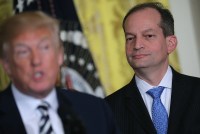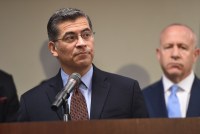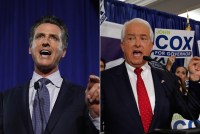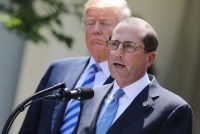Latest Morning Briefing Stories
Administration Eases Way For Small Businesses To Buy Insurance In Bulk
The Trump administration issued the final rule on association health plans, which supporters say will make coverage more affordable for some employees but led others to warn about “junk insurance.”
Postcard From D.C. Courthouse: Medicaid Work Requirements And Manafort
Oral arguments are heard in a legal challenge regarding the state of Kentucky’s requirement that adults who gained Medicaid coverage under the Affordable Care Act’s expansion prove that they work or volunteer in order to get health coverage.
Must-Reads Of The Week From Brianna Labuskes
KHN’s newsletter editor, Brianna Labuskes, wades through hundreds of health articles from the week so you don’t have to.
Most Texans Want State To Expand Medicaid And Help Poor Get Health Care
Texans think the Legislature should expand Medicaid to more low-income people and make health care more affordable, according to a survey released today from the Kaiser Family Foundation and the Episcopal Health Foundation.
Podcast: KHN’s ‘What The Health?’ California Here We Come
In this episode of KHN’s “What the Health?” Julie Rovner of Kaiser Health News, Carrie Feibel of KQED San Francisco, Anna Maria Barry-Jester of FiveThirtyEight.com and Joanne Kenen of Politico report from San Francisco on the complicated health politics of the Golden State and the latest news on a lawsuit challenging parts of the Affordable Care Act. Plus, for extra credit, the panelists offer their favorite health stories of the week.
California’s Attorney General Vows National Fight To Defend The ACA
Xavier Becerra, who is leading an effort by at least 15 states to protect the law, said the Trump Administration’s efforts to dismantle it endangers coverage for millions of Americans.
Administration Challenges ACA’s Preexisting Conditions Protection In Court
The Trump administration is arguing that since Congress is repealing the penalty for not having insurance, the federal health law’s protection for people who have illnesses is unconstitutional.
Must-Reads Of The Week From Brianna Labuskes
KHN’s newsletter editor, Brianna Labuskes, wades through hundreds of health articles from the week so you don’t have to.
Podcast: KHN’s ‘What The Health?’ Health Care Politics, Midterm Edition
In this episode of KHN’s “What the Health?” Julie Rovner of Kaiser Health News, Alice Ollstein of Talking Points Memo, Stephanie Armour of The Wall Street Journal and Rebecca Adams of CQ Roll Call discuss how Medicare, Medicaid and the fate of the Affordable Care Act are playing out in the politics of the coming midterm elections. Plus, Rovner interviews Matt Eyles, president and CEO of America’s Health Insurance Plans.
Could California Shape The Fate Of The Affordable Care Act In November?
With the primary now over, health care may well emerge as an issue that helps voters distinguish between candidates for governor, attorney general and other offices in the general election.
HHS To Allow Insurers’ Workaround On 2019 Prices
Many states instituted the technique known as “silver loading” this year after President Donald Trump cut federal payments to insurers. But some conservatives objected because it meant the cost of premium subsides for the federal government went up.
A Hospital ER Charges An ‘After-Hours’ Fee. Who Has To Pay It?
Tacking on an after-hours surcharge to an emergency department bill strikes some consumers as unfair, since the facilities are open 24 hours a day.
Health Care Simmers On Back Burner In California Heartland’s Hot House Races
After rallies and protests in the San Joaquin Valley congressional districts, the urgency over protecting coverage under the ACA seems to have waned — at least in the primaries. Three of four seats in the region are likely to remain red, political forecasters say.
Health Care Looms Large In Race For California’s Top Cop
Attorney General Xavier Becerra, who has made a name for himself opposing Trump administration policies on health care and other matters, is running against opponents who say they wouldn’t make such resistance their primary focus.
Best Reads Of The Week With Brianna Labuskes
KHN’s newsletter editor, Brianna Labuskes, wades through hundreds of health articles from the week so you don’t have to.
Podcast: KHN’s ‘What The Health?’ Campaign Promises Kept, Plus ‘Nerd Reports’
In this episode of KHN’s “What the Health?” Julie Rovner of Kaiser Health News, Margot Sanger-Katz of The New York Times, Sarah Kliff of Vox and Alice Ollstein of Talking Points Memo discuss a proposed administration regulation that seeks to separate Planned Parenthood from federal family planning funds, the final congressional passage of legislation aimed at helping those with terminal illnesses obtain experimental medications, and new government reports on the uninsured and federal health spending. Also, Rovner interviews KHN’s Liz Szabo about the May “Bill of the Month.”
Insurer Slashes Breast Pump Payments, Stoking Fears Fewer Moms Will Breastfeed
Anthem, one of the country’s largest insurers, has cut the reimbursement rate it pays for breast pumps by nearly half, fueling concerns that new moms — especially ones with lower incomes — will not be able to afford the pumps they need.
Best Reads Of The Week With Brianna Labuskes
KHN’s newsletter editor, Brianna Labuskes, wades through hundreds of health articles from the week so you don’t have to.
Lack Of Insurance Exposes Blind Spots In Vision Care
As many as 16 million people in the United States have undiagnosed or uncorrected vision problems that could be fixed with eyeglasses, contact lenses or surgery.
L.A. County Unlawfully Terminated Thousands Of Medi-Cal Recipients, Court Rules
A judge orders the county to fix problem that harmed low-income seniors and people with disabilities, including those with serious health conditions.





















